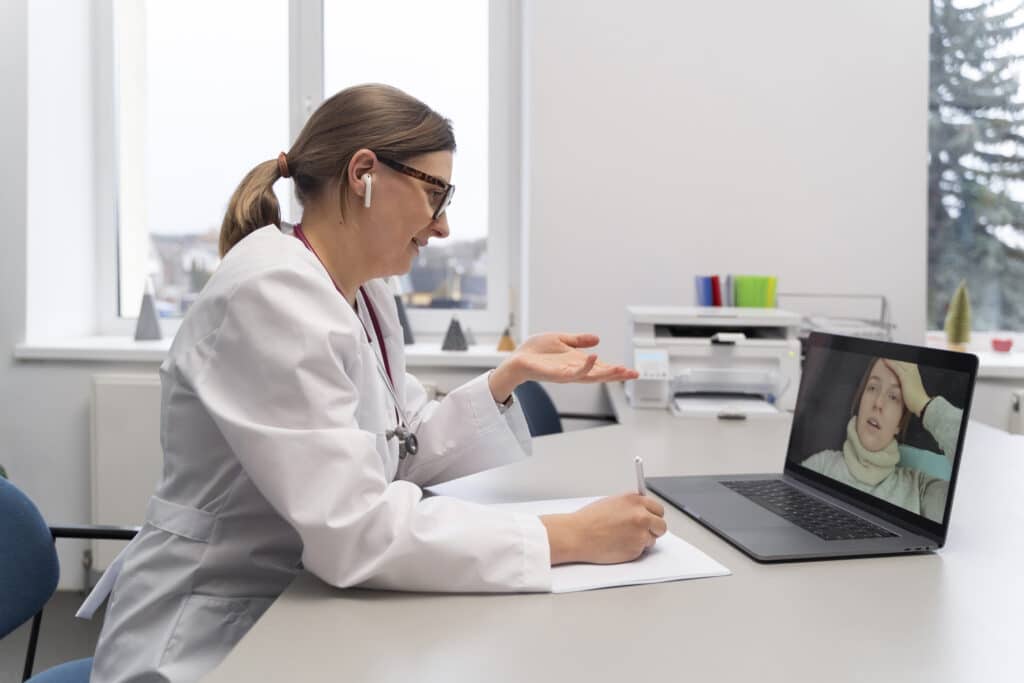
The healthcare industry is evolving at a rapid pace, and practices are under increasing pressure to deliver high-quality patient care while managing mounting administrative tasks. In today’s modern healthcare landscape, maintaining a smooth, cost-effective, and patient-focused operation is no longer a luxury—it’s a necessity. This is where mastering the top 10 essential duties of a medical receptionist becomes critical, as these responsibilities form the backbone of an efficient front office and directly impact patient satisfaction and overall workflow.
One of the most effective ways to achieve this is by hiring a virtual medical receptionist—a specialized virtual assistant who remotely supports front office operations. These experienced staff play a crucial role in improving practice workflow, enhancing the patient experience, and delivering prompt and courteous service that meets today’s expectations.
In this comprehensive guide, we explore the numerous benefits of hiring a virtual medical receptionist, how they enhance patient care, impact your medical office or medical practice, and why healthcare providers are rapidly embracing this cost-effective solution.
What Is a Virtual Medical Receptionist?
A virtual medical receptionist is a remote virtual assistant trained in medical terminology, HIPAA compliance, and front desk operations. These professionals manage critical administrative duties such as:
Appointment scheduling tasks
Verifying insurance
Answering patient inquiries
Handling phone calls
Managing patient communications and prescription refills
Updating patient records and patient data
By working offsite, they eliminate the need for physical office space, allowing practices to allocate resources more efficiently.
Hiring Virtual Medical Receptionist Benefits
1. Reduced Overhead Costs
Hiring an in-house receptionist comes with costs—salaries, benefits, training, workspace, and equipment. A virtual medical receptionist eliminates many of these expenses. You only pay for the services you need, reducing overhead costs without sacrificing quality.
According to a study by the American Medical Association, administrative burden is one of the top contributors to physician burnout and inefficiency. Virtual assistants significantly lighten that burden.
2. Improved Practice Efficiency
When in-house staff are overburdened with clerical responsibilities, patient care can suffer. A virtual receptionist helps streamline operations, ensuring tasks like scheduling appointments, insurance claims, and patient calls are handled swiftly and professionally.
This boosts practice efficiency, allowing medical staff to focus on clinical responsibilities.
3. Enhanced Patient Satisfaction
Patient experience begins with the first interaction—often a phone call or message. A virtual medical assistant ensures prompt and courteous service, contributing to an enhanced patient experience and significantly improving patient satisfaction. Calls are answered quickly, questions are resolved, and follow-ups are timely.
🧠 A Harvard Business Review report found that customer experience is directly tied to loyalty. In healthcare, this translates into patient retention and positive outcomes.
4. Around-the-Clock Availability
Unlike traditional staff, many virtual receptionist services offer 24/7 support. This ensures your patients can schedule appointments or ask questions—even after office hours. In an always-on world, this level of consistent service sets your healthcare practice apart.
5. Greater Flexibility
Need help only during peak hours or certain days of the week? A virtual medical receptionist offers scalable support. You can adjust service levels as your needs change—making it a highly cost-effective and flexible staffing solution.
6. Improved Patient Communication
Effective communication is vital in healthcare. Virtual receptionists use multiple communication channels (phone, email, SMS, web forms) to ensure patients receive timely updates, reminders, and answers to their questions.
7. Compliance with HIPAA Regulations
All reputable virtual medical receptionist services ensure strict adherence to HIPAA compliance standards. They are trained to manage sensitive information and patient data securely and confidentially.
8. No Need for Extra Office Space
A physical receptionist requires a desk, computer, phone, and workspace. A virtual assistant requires none of that, freeing up valuable medical office real estate and reducing your operational footprint.
9. Seamless Appointment Scheduling
Missed appointments and double bookings are costly. A virtual medical receptionist uses advanced scheduling tools to ensure accuracy, reduce no-shows, and optimize provider calendars for smooth operations.
10. Expert Insurance Verification
Verifying insurance is time-consuming but essential. Virtual receptionists are trained in insurance verification processes, ensuring accurate data capture and reducing delays in care delivery or billing.
11. Positive Work Environment for In-House Staff
When existing staff are freed from repetitive tasks, they can focus on more meaningful responsibilities—leading to greater job satisfaction and a more engaged, motivated team
12. Faster Response to Patient Inquiries
Patients expect quick answers. A virtual medical receptionist can respond to patient inquiries in real-time, improving patient trust and contributing to a positive patient experience.
13. Efficient Handling of Prescription Refills
Refilling medications is a vital but repetitive task. Virtual medical assistants can manage prescription refill requests, verify eligibility, and ensure patients receive their medications promptly.
14. Enhanced Health Outcomes
Timely communication, proper scheduling, and efficient data management by a virtual receptionist contribute to better health outcomes. With fewer errors and delays, patients receive the right care at the right time.
15. Better Use of Medical Staff
Doctors, nurses, and other staff members shouldn’t be tied up with phone calls or insurance verification. Delegating these responsibilities to a virtual receptionist enhances workflow efficiency and helps prevent staff burnout.
Unseen Clinical Roles of Medical Receptionists in the UK
The pie chart shows that receptionists play vital roles in facilitating access and triage (40%), administering repeat prescriptions (35%), and relaying test results (25%), all of which directly impact patient care despite their lack of formal clinical training.
16. Trained Professionals with Medical Knowledge
Unlike general virtual assistants, virtual medical receptionists understand medical terminology, billing processes, and the unique demands of healthcare providers. Their expertise ensures error-free work.
17. Scalable for Any Size Medical Practice
Whether you run a solo medical practice or a multi-location healthcare facility, a virtual receptionist can scale with your needs, offering the right level of support without long-term commitments.
18. Stronger Patient Relationships
With more time available, your staff can focus on building stronger patient interactions—leading to better engagement and loyalty.
19. Cost Savings on Training and Onboarding
Training new hires is expensive and time-consuming. Virtual receptionist companies provide already experienced staff saving your healthcare practice valuable time and money.
20. Secure Handling of Patient Records
Maintaining patient records requires accuracy and confidentiality. Virtual receptionists follow best practices for digital record-keeping, ensuring legal and medical standards are upheld.
21. Clear Communication with Patients
Miscommunication leads to errors. Virtual receptionists are skilled in maintaining clear communication, ensuring patients understand instructions, appointments, and follow-ups.
22. Adaptability to Modern Healthcare Tools
From EHR platforms to appointment software, remote medical assistants are adept at using modern tools that drive operational efficiency and digital transformation in healthcare.
23. Increased Capacity Without Hiring Full-Time Staff
Need extra help but can’t afford a full-time hire? A virtual receptionist gives you added capacity without the financial burden of a traditional employee.
24.Streamline Claims and Billing for Greater Cost-Effectiveness
Many virtual assistants also support processing tasks, helping to minimize errors and accelerate reimbursement times
25. Gives Providers More Time for Patients
Most importantly, delegating administrative tasks to a virtual assistant gives your healthcare professionals more time to do what matters most: care for patients—while also supporting a healthier work-life balance.
What we provide
Virtual Medical Administrative Assistant
Medical Virtual Receptionist
Remote Medical Scribe
Medical Billing Virtual Asssistant
Executive VA & Virtual Office Manager
Virtual Dental Administrative Assistant
Dental Virtual Receptionist
Remote Dental Scribe
Dental Billing Virtual Assistant
Virtual Dental Executive Assistant
Patient Care Coordinator
Prior-Authorization
Provider Support
Telehealth Specialist
Telephone Triage
Remote Patient Monitoring
Trusted Sources That Validate the Shift to Virtual Support
Why Every Medical Practice Needs a Virtual Receptionist Today
In an age where digital transformation and rising patient expectations are reshaping the healthcare environment, hiring a virtual medical receptionist is no longer just an optional upgrade—it’s a significant advantage for any practice. This modern solution offers a strategic way for every healthcare professional to reduce administrative burdens, streamline operations, and stay competitive in a demanding industry. From substantial cost savings to consistently improved patient care, the benefits are both measurable and transformative.
Whether you’re striving to boost patient satisfaction, optimize daily workflows, or support your existing staff in delivering high-quality service, integrating a virtual medical receptionist into your medical office delivers tangible improvements to your bottom line while directly enhancing your patients’ overall well-being.
Ready to Elevate Your Practice?
If you’re a healthcare provider seeking reliable, HIPAA-compliant, and professional virtual receptionist services, we’re here to help. Let our experienced staff handle the admin so you can focus on what you do best—caring for patients.




